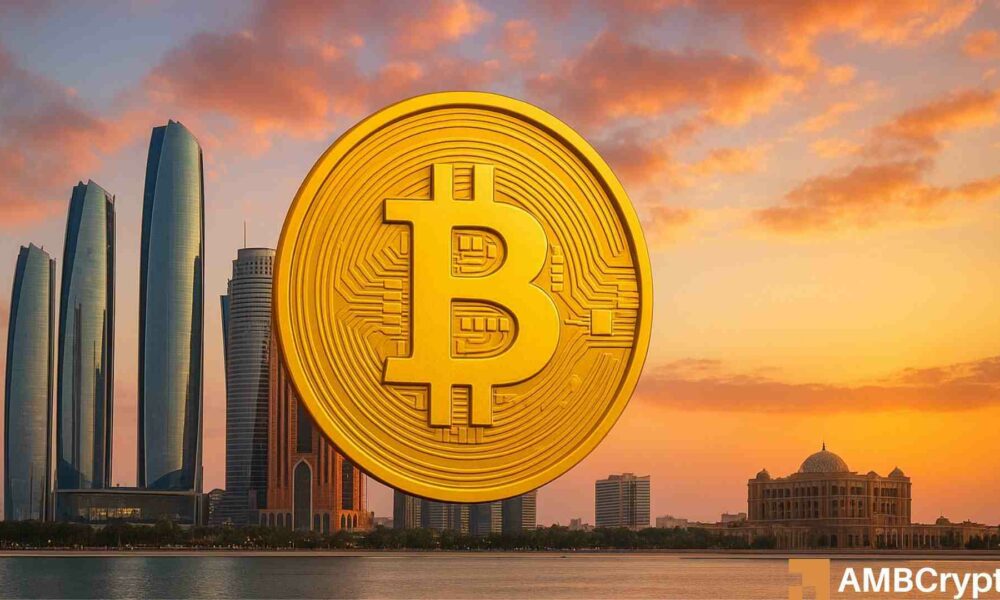Why the UAE is Significantly Increasing Its Bitcoin Holdings
The United Arab Emirates (UAE) has emerged as a formidable player in the Bitcoin (BTC) landscape, significantly boosting its crypto assets. With the nation tripling its Bitcoin holdings in 2025, there is growing intrigue around its investment strategy, particularly as it positions BTC as a “digital gold.” This strategy reflects broader global trends, as governments worldwide increasingly recognize Bitcoin’s potential as a strategic asset.
The UAE’s Strategic View on Bitcoin
The impetus behind the UAE’s aggressive Bitcoin purchasing strategy can be primarily attributed to its evolving relationship with digital currencies. Viewers of Bitcoin see it evolving into a form of "digital gold," which offers similar properties of scarcity and store of value. The Abu Dhabi Investment Council (ADIC), a key player in this strategy, reported a staggering 230% increase in its position in BlackRock’s iShares Bitcoin Trust, raising its holdings to nearly $518 million. ADIC, though independently managed, is a subsidiary of Mubadala, a sovereign wealth fund owned by the UAE. Their spokesperson emphasized Bitcoin’s significant role in diversifying investment portfolios, indicating that the UAE is serious about leveraging this digital currency as a long-term strategic reserve asset.
The Growing Global Demand for Bitcoin
The UAE isn’t alone in recognizing the value of Bitcoin as an asset class. Globally, there has been a marked increase in demand for BTC among government entities. Currently, various state actors collectively hold over 645,000 BTC, marking them as the third-largest holders of the asset, after public companies and ETFs. Notable new participants include the Czech Republic, which recently acquired its first $1 million in Bitcoin and other crypto assets. Meanwhile, nations like Luxembourg and Saudi Arabia have also begun investing, emphasizing a trend towards broader acceptance of digital currencies in financial portfolios.
El Salvador and Emerging Markets
El Salvador has often been at the forefront of Bitcoin adoption, recently adding $100 million worth of BTC to its holdings, totaling 7,474 coins valued at approximately $676 million. This move further cements the country’s position in the crypto landscape and serves as a testament to the increasing acceptance of Bitcoin amid rising national awareness. The growing number of countries joining the Bitcoin bandwagon indicates a burgeoning recognition of its utility and potential merits.
Bitcoin in the Context of Gold
According to digital asset manager Bitwise, the current holdings of Bitcoin by governments represent only a mere 1.5% compared to the 17% typically allocated to gold. This statistic underscores the fact that Bitcoin is still in the early adoption stages among nations. The continued accumulation by states suggests a keen expectation that BTC’s value may appreciate over time, offering a compelling reason for countries to increase their stakes.
Q4 Market Dynamics and Long-Term Conviction
The dynamics of the cryptocurrency market can fluctuate significantly, as evidenced by the nearly 30% decline in Bitcoin prices during Q4 2025, bringing its value down to $90,000. Consequently, nation-state holders have been exposed to substantial paper losses. This sell-off has raised questions regarding which governments possess a strong conviction to hold onto their Bitcoin investments despite market volatility. Anticipation of Q4 filings, expected in early 2026, will provide clearer insights into how different nations are navigating the turbulent waters of cryptocurrency investment.
Conclusion: The Future of Bitcoin as a Strategic Asset
In summary, the UAE’s amplified Bitcoin holdings signify a pivotal shift towards the recognition of digital currencies as essential investment assets. With the global trend indicating an increasing acceptance of Bitcoin among governments—including newcomers like the Czech Republic and established players like El Salvador—the narrative surrounding Bitcoin continues to evolve. As seen in both the UAE and other nations, the potential for Bitcoin to function as a strategic reserve asset remains robust despite market volatility. Moving forward, it will be fascinating to observe how these trends develop, potentially positioning Bitcoin not only as a reserve asset but also as a fundamental component of future economic strategies worldwide.


